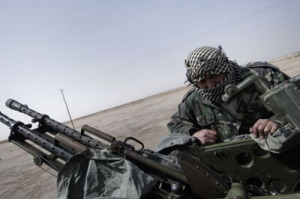
The kidnappings have been joined the list of the criminal acts against foreign missions committed over the past two and a half years after the overthrow of Gaddafi. The list includes the killing of the US ambassador and three Americans in Benghazi in September 2012, the explosion at the French embassy in Tripoli in 2013, the raid on the Russian embassy in October of the same year etc.
The unidentified gangs detaining the diplomats demand that the Libyan Islamists currently imprisoned in both countries should be released in exchange for the release of these hostages. In Tunisia, these are the perpetrators of the attack on this country’s military in 2011; in Jordan, it is a Libyan serving a life sentence for involvement in the planning of the explosion at the Amman airport.
Incidents involving kidnappings have cast a dark shadow over the political landscape of Libya. It is stressed in the country’s expert circles that the practice of kidnapping of Libyan citizens, including, in particular, government army officers, judges and journalists, has now been extended by the extremists to foreign diplomats as well. It tarnishes the country’s image and is harmful to Libya’s relations with the countries with which it has always had special ties. For example, the Tunisian authorities have provided shelter to hundreds of thousands of Libyan refugees. Libya has strong ties with Jordan in terms of humanitarian and medical aid: the medical institutions of the latter have treated at least 15 thousand wounded and sick Libyans over the past three years.
Experts believe that agreeing to the kidnappers’ requirements would become a precedent fraught with danger to foreign diplomats in Libya. They can become a bargaining chip in the actions of the groups of a regional, clan and religious nature.
Negotiations over the hostage diplomats between the authorities of the three countries are being held against the backdrop of a reshuffling in the upper echelons of the Libyan leadership. For the last one and a half months, the Libyan government has been led by interim Prime Minister Abdullah al-Thinni. He refused to form a new cabinet on the grounds that he and his family had been attacked by militants.
When new prime minister candidates were being discussed on 29 April of this year, a group of armed people broke into the parliament building, opened fire and dispersed the deputies. Such raids on parliament have become commonplace, with at least ten of them having taken place since the election of this body in the summer of 2012.
At the beginning of May, in the cradle of the revolution, Benghazi, militants from the Ansar al-Sharia group stormed the National Security Directorate and killed 9 soldiers.
In this atmosphere, quite a few assumptions and speculations have appeared in media space regarding the captured diplomats, including a report about the plans of Jordan’s special operations forces to undertake measures aimed at liberating their ambassador in Libya, but it was refuted.
According to the London-based Arabic language newspaper Al-Arab, in the face of the current spiral of tensions and chaos in Libya, a number of European and Arab countries are preparing an operation against the radical groups operating in its territory without control.
According to the version of an anonymous diplomat quoted by the newspaper, the talk is of limited, “surgical actions” with selected targets and the use of aircraft and commando units.
It is noted that the oil companies, suffering losses because of the armed militias that have made themselves at home in Libya, are ready to contribute financially to the operation called Flowers of Spring. Nothing is said about the exact date of the operation and its concrete participants.
This information appeared on the pages of many publications but remained uncommented upon by the official authorities.
After the capture of the Tunisian and Jordanian diplomats, no one can deny the fact that Al-Qaeda elements have infiltrated into Libya and that they have many supporters in its power structures – former interior minister of this country F. Abdul Al states on his Facebook page.
According to the London-based Libyan researcher M. Al-Jarha, the events in Libya are intensifying the fears among Libya’s friends in the West, who have promised their help with training military and security personnel so that an advanced power bloc could be established in the country.
The international community needs to reassess the strategy of relations with the Libyan partners. It is important that Western aid to Libya should not fall into the “wrong hands”.
But how to do that if Libya is increasingly turning into a magnet that attracts all sorts of extremist elements from the Middle Eastern region?
Yuriy Zinin, senior researcher at the Moscow State Institute of International Relations (MGIMO); exclusively for the online magazine “New Eastern Outlook”.
